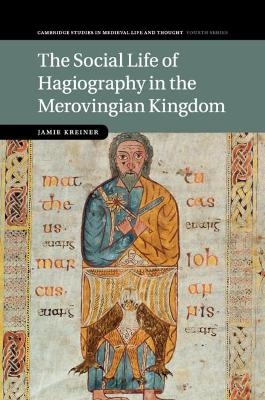
The Social Life of Hagiography in the Merovingian Kingdom
Seiten
2018
Cambridge University Press (Verlag)
978-1-107-65839-4 (ISBN)
Cambridge University Press (Verlag)
978-1-107-65839-4 (ISBN)
This book explains how Christianity influenced the government, how religion was flexible, and how literature became one of the most influential forces in early medieval Gaul. Its picture of post-Roman Europe as a philosophical, collaborative and experimental society will both attract and surprise fans of 'barbarian' and early Christian history.
This book charts the influence of Christian ideas about social responsibility on the legal, fiscal and operational policies of the Merovingian government, which consistently depended upon the collaboration of kings and elites to succeed, and it shows how a set of stories transformed the political playing field in early medieval Gaul. Contemporary thinkers encouraged this development by writing political arguments in the form of hagiography, more to redefine the rules and resources of elite culture than to promote saints' cults. Jamie Kreiner explores how hagiographers were able to do this effectively, by layering their arguments with different rhetorical and cognitive strategies while keeping the surface narratives entertaining. The result was a subtle and captivating literature that gives us new ways of thinking about how ideas and institutions can change, and how the vibrancy of Merovingian culture inspired subsequent Carolingian developments.
This book charts the influence of Christian ideas about social responsibility on the legal, fiscal and operational policies of the Merovingian government, which consistently depended upon the collaboration of kings and elites to succeed, and it shows how a set of stories transformed the political playing field in early medieval Gaul. Contemporary thinkers encouraged this development by writing political arguments in the form of hagiography, more to redefine the rules and resources of elite culture than to promote saints' cults. Jamie Kreiner explores how hagiographers were able to do this effectively, by layering their arguments with different rhetorical and cognitive strategies while keeping the surface narratives entertaining. The result was a subtle and captivating literature that gives us new ways of thinking about how ideas and institutions can change, and how the vibrancy of Merovingian culture inspired subsequent Carolingian developments.
Jamie Kreiner is Assistant Professor of History at the University of Georgia where she researches and teaches the history of Late Antiquity and the Middle Ages.
Introduction; 1. Hagiographical argument and legal culture; 2. The style and science of persuasion; 3. Double-scope narrative and the economy of government; 4. Property and community beyond the cult; 5. The Carolingian synthesis; Appendix; Bibliography; Index.
| Erscheinungsdatum | 08.10.2018 |
|---|---|
| Reihe/Serie | Cambridge Studies in Medieval Life and Thought: Fourth Series |
| Zusatzinfo | Worked examples or Exercises |
| Verlagsort | Cambridge |
| Sprache | englisch |
| Maße | 153 x 230 mm |
| Gewicht | 520 g |
| Themenwelt | Geschichte ► Allgemeine Geschichte ► Mittelalter |
| Geisteswissenschaften ► Geschichte ► Regional- / Ländergeschichte | |
| Geschichte ► Teilgebiete der Geschichte ► Kulturgeschichte | |
| Geschichte ► Teilgebiete der Geschichte ► Sozialgeschichte | |
| Sozialwissenschaften ► Politik / Verwaltung | |
| ISBN-10 | 1-107-65839-X / 110765839X |
| ISBN-13 | 978-1-107-65839-4 / 9781107658394 |
| Zustand | Neuware |
| Haben Sie eine Frage zum Produkt? |
Mehr entdecken
aus dem Bereich
aus dem Bereich
eine neue Geschichte des Mittelalters
Buch | Hardcover (2023)
C.H.Beck (Verlag)
CHF 53,20


